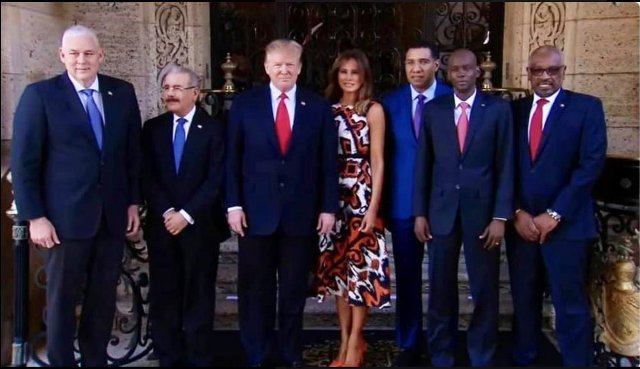 President Trump met the leaders of St Lucia, the Dominican Republic, Jamaica, Haiti and the Bahamas in March 2019. [Photo: Office of the Prime Minister, Jamaica]
President Trump met the leaders of St Lucia, the Dominican Republic, Jamaica, Haiti and the Bahamas in March 2019. [Photo: Office of the Prime Minister, Jamaica]
[This is an excerpt from an article appearing in the current edition of The Round Table: The Commonwealth Journal of International Affairs.]
Reduction in Development Assistance
The final set of threats comes from President Trump’s ‘budget blueprint’ released on 16 March 2017. Of course this is just an initial set of aspirations for the federal government. However, it is likely that some of what is proposed will pass including the reduction in government expenditure. The developing states of the Caribbean rely on development assistance and grants from their international partners such as the US, England and Canada among other countries. The largest share of assistance comes from the US.
Therefore, for the Caribbean, the proposed cuts to the US Coast Guard budget would undermine the 1998 Shiprider Agreement and America’s capability to fight drug trafficking in the region as well as funding to train personnel, repair and upgrade the equipment and/or fleets of those countries with a coast guard. Less money for the Inter-American Foundation would also mean a reduction in funding for many Caribbean non-governmental organizations that are very important players in the civil societies that espouse American values and policy positions and, as such, play key roles in these emerging democracies. Cuts to the Emergency Refugee and Migration Assistance Fund would also limit the provision of humanitarian support in the region that is vulnerable to increasingly powerful hurricanes and so on. In addition, a downsizing of the State Department’s Bureau of International Organization Affairs would put funding at risk for the Organisation of American States and other key regional groupings that promote regional and hemispheric cooperation, development and security.
The foregoing suggests that budgetary cuts in the US that are beneficial to the country are detrimental to the economic survival of the Caribbean because of their economic relationship with the US. This economic relationship with the US gives it unbridled influence in the domestic and international affairs of these small states. The Caribbean countries have fragile economies despite their economic relationships with the US. These fragile economies are especially problematic for the Caribbean when the president is an ultra-conservative like Donald Trump who espouses the America first worldview. Trump’s 2019 budget blue print is likely to be even more conservative when the federal government reopens.
The Caribbean, in its attempts to achieve economic growth and development through trade, has been operating in other parts of the world in addition to their relationship with the US. The Caribbean Forum-European Union (CARIFORUM-EU) partnership agreement gives the region some leverage in Brussels. The agreement not only covers the traditional area of trade but also issues such as the synergy between trade and sustainable development including better labour standards and environmental practices. It also covers public procurement and competition policy. However, the parties to the agreement have noted that moving beyond negotiations there are many challenges to implementation that needs to be addressed despite some positives. CARIFORUM, in this regard, needs capacity building support from the EU.
Despite the implementation challenges that hurt CARIFORUM more than the EU, and the possible impact of Trump’s policies, there are other opportunities elsewhere that Caribbean states should be able to exploit to serve their economic interests. Some of these are a growing range of choices such as Brazil, Russia, India, China and South Africa (BRICS) as well as Mexico, and Spain. Investors from latter have met key stakeholders in the Caribbean tourism industry and have built five-star hotels in several Caribbean countries that have boosted the tourism products. China with its own imperialist ambitions has been very active building infrastructure in Africa and the Caribbean and making other large investments. Another major alternative for Caribbean governments to consider and tap into is the global south (the developing countries of Africa, Latin America and Asia) by negotiating trade agreements with these countries for export-led economic growth and development. There are still other opportunities to make use of such as sovereign wealth funds and the development grants provided by new foundations like the Bill and Melinda Gates Foundation, among others. The Caribbean also stands to gain from the opportunities for trade and technical assistance that will arise from the decriminalization of Cannabis in several states in the region and the legalization of cannabis in Canada.
Conclusion
Caribbean states, given their small size and population, their limited resources, their fragile economies, the high rates of violent crimes and their relatively close proximity to the US, will be severely impacted by the America’s domestic and foreign policies. However, Caribbean governments should take consistent and coordinated principled foreign policy positions towards the US that serve their national and regional interests and look elsewhere for economic opportunities such as with BRICS, China and the Global South and exploit them.
Christopher A. D. Charles is a Senior Lecturer in Political Psychology, University of the West Indies, Kingston, Jamaica and Danny Roberts is the Head of the Hugh Lawson Shearer Trade Union Education Institute, University of the West Indies, Kingston.



